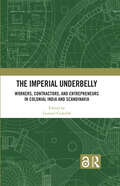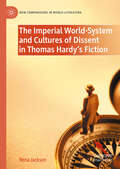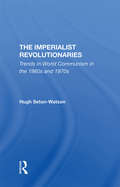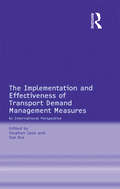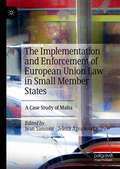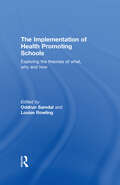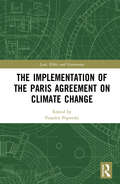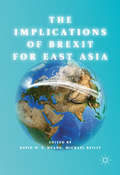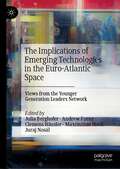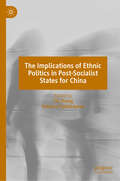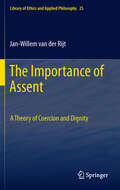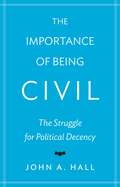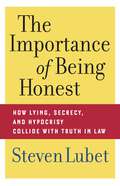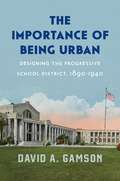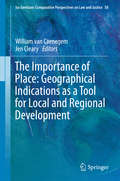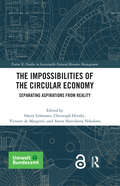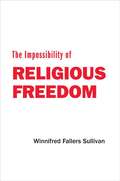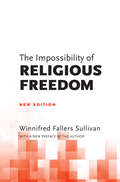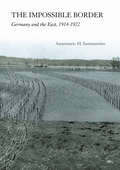- Table View
- List View
The Imperial Underbelly: Workers, Contractors, and Entrepreneurs in Colonial India and Scandinavia
by Gunnel CederlöfThe volume introduces a new analysis of interconnected labour and economic history of colonial India and Scandinavia. From a recently found archive of a railway contractor’s private and business papers, the studies revise both Indian labour history and Scandinavian modern history, and ties south Sweden into the British Empire. With deep insights into everyday work practices of Indian and European contractors and manual labourers, the book establishes a bridge across the globe, between two poor regions as sites of extraction and industrial transformation, resulting from global migration and capital flows. Drawing on rich archival sources such as the Joseph Stephens Archive, Maharashtra State Archives, the National Archives of India, and the British Library, the book offers deep insights into everyday business practices of European contractors in India, which were rarely documented and have remained largely inaccessible so far. A unique look into the labour and entrepreneurship practices under British colonial rule in India, as well as its impact on the most transformative years of modern southern Scandinavia, the book will be of great interest to students, academics, and teachers of history, labour studies, subaltern studies, colonialism, imperialism, economic history, railways, economics, and Scandinavian and South Asian studies.
The Imperial World-System and Cultures of Dissent in Thomas Hardy's Fiction (New Comparisons in World Literature)
by Rena JacksonThis is the first book-length study of imperial crossings in Thomas Hardy’s novels and short stories. Combining the strengths of world-literary and world-systems analyses with a cultural materialist approach, the study offers unparalleled coverage of global links in Hardy’s fiction, engaging, in addition, with a range of dissenting responses – at both formal and thematic registers – to the British world-system’s exploitative structures. Hardy’s prose outputs reveal that the empire, contrary to popular critical assumptions in postcolonial studies, did not harmonise the classes, genders or regions into a shared national imperial identity, culture or destiny. A major component of the study additionally includes comparative readings of the 'modern' world-system and imperial sociality in writings by Joseph Conrad, H. Rider Haggard, Elizabeth Gaskell, Rudyard Kipling, David Livingstone, and in Chartist poetry. The book will be an invaluable resource to teachers, students and enthusiasts working in the field of world literature, and in Victorian, postcolonial and settler colonial studies.
The Imperialist Revolutionaries: Trends In World Communism In The 1960s And 1970s
by Hugh Seton-watsonThis book provides a detailed, systematic, and factually reliable survey of the activities of communist parties and identifies main trends in communist affairs. It focuses on the themes of revolution, nationalism, and the communist's movement mythology.
The Implementation Game: What Happens After a Bill Becomes a Law (MIT Studies in American Politics and Public Policy)
by Eugene BardachImplementation Game: What Happens After a Bill Becomes a Law by Eugene Bardach
The Implementation and Effectiveness of Transport Demand Management Measures: An International Perspective
by Tom RyeCongestion and traffic-related pollution are increasingly becoming major issues in towns and cities world-wide. This book deals with carefully selected market and non-market based measures to reduce congestion, and their implementation and effectiveness in tackling the problem. The book features a multi-authored research-based text comprising 12 individual chapters that draw upon relevant case studies. The authors were specifically chosen for their global expertise in terms of the respective Demand Management Tools. Drawing on international case studies, the book details the role played internationally by selected Transport Demand Management (TDM) measures in dealing with both congestion and traffic-related pollution in urban areas, focusing on their relative merits and in particular their effectiveness and the issues surrounding implementation.
The Implementation and Enforcement of European Union Law in Small Member States: A Case Study of Malta
by Ivan Sammut Jelena AgranovskaThe objective of this book is to examine how the legal order of Malta, the EU's smallest Member State, manages to cope with the obligations of the EU's acquis communautaire. As far as the legal obligations are concerned, size does not matter. Smaller Member States have the same obligations as the largest, yet they have to meet these same obligations with very fewer resources. This book examines how the Maltese legal system manages to fulfil its obligations both in terms of the supremacy of EU law, as well as how the substantive EU law is transposed and implemented. It also explores how Maltese courts look at EU law and how they manage, or not manage, to enforce it within the context of national law. It can serve as a model to demonstrate how EU law is being implemented in the smallest Member State and can serve as a basis to study the effectiveness of EU law into the domestic law of its Member States in general.
The Implementation of Health Promoting Schools: Exploring the theories of what, why and how
by Oddrun Samdal Louise RowlingDeveloping a ‘healthy school’ has been a key aim for many schools across the globe, yet achieving successful implementation and sustaining the positive benefits has proven to be challenging. In this much-needed text, the contributors draw upon their wide range of international expertise and experience to demonstrate how guidelines can best be implemented by building upon scientific knowledge of ‘implementation theory’, as well as empirically-based practice from health-promoting school initiatives. The Implementation of Health Promoting Schools articulates an evidence base for implementation that is centred on eight theorised implementation components, each of which is designed to help practitioners to utilise theory-based guidelines within the school as an organisational setting. This approach differs from more traditional implementation guidelines for pre-packaged programs, which are often only focused on providing guidance to an individual teacher in a classroom. Needs for further research to confirm and add to the identified components are also addressed. With contributions from leading experts around the world, this book is structured around three main sections: Part One: addresses the theory base for implementation of health promoting schools Part Two: provides examples through case studies Part Three: identifies directions for future developments. Authoritative, research-based and supported by examples from concrete practices in schools and governmental bodies at local and national level, this text provides guidance that is vital for future advancement of the field, and is essential reading for teachers, educational professionals and policy makers. It will also appeal to researchers, academics and undergraduate and postgraduate students studying whole school health practice and research.
The Implementation of the Findings of the African Commission on Human and Peoples’ Rights
by Rachel Murray Murray, Rachel and Long, Debra Debra LongAn 'implementation crisis' has been identified in the enforcement of rulings of UN and regional human rights bodies and fundamental but crucial questions remain unanswered: what exactly does it mean to implement and comply with international and regional human rights decisions; and what factors influence whether a state implements and complies or not? Much more is now known about the work of the African Commission on Human and Peoples' Rights, but a gap still exists in the literature on the implementation of the findings of the Commission. This book draws upon the data and evaluation from a four-year research project, analysing the range of pronouncements of the African Commission, including its decisions on individual communications, provisional measures, resolutions, and promotional and protective mission reports. It investigates the extent to which States implement these findings and examines how that implementation is monitored by others.
The Implementation of the Paris Agreement on Climate Change (Law, Ethics and Governance)
by Vesselin PopovskiIn December 2015, 196 parties to the United Nations Framework Convention on Climate Change (UNFCCC) adopted the Paris Agreement, seen as a decisive landmark for global action to stop human- induced climate change. The Paris Agreement will replace the 1997 Kyoto Protocol which expires in 2020, and it creates legally binding obligations on the parties, based on their own bottom-up voluntary commitments to implement Nationally Determined Contributions (NDCs). The codification of the climate change regime has advanced well, but the implementation of it remains uncertain. This book focuses on the implementation prospects of the Agreement, which is a challenge for all and will require a fully comprehensive burden- sharing framework. Parties need to meet their own NDCs, but also to finance and transfer technology to others who do not have enough. How equity- based and facilitative the process will be, is of crucial importance. The volume examines a broad range of issues including the lessons that can be learnt from the implementation of previous environmental legal regimes, climate policies at national and sub-national levels and whether the implementation mechanisms in the Paris Agreement are likely to be sufficient. Written by leading experts and practitioners, the book diagnoses the gaps and lays the ground for future exploration of implementation options. This collection will be of interest to policy-makers, academics, practitioners, students and researchers focusing on climate change governance.
The Implicated Subject: Beyond Victims and Perpetrators (Cultural Memory in the Present)
by Michael RothbergWhen it comes to historical violence and contemporary inequality, none of us are completely innocent. We may not be direct agents of harm, but we may still contribute to, inhabit, or benefit from regimes of domination that we neither set up nor control. Arguing that the familiar categories of victim, perpetrator, and bystander do not adequately account for our connection to injustices past and present, Michael Rothberg offers a new theory of political responsibility through the figure of the implicated subject. The Implicated Subject builds on the comparative, transnational framework of Rothberg's influential work on memory to engage in reflection and analysis of cultural texts, archives, and activist movements from such contested zones as transitional South Africa, contemporary Israel/Palestine, post-Holocaust Europe, and a transatlantic realm marked by the afterlives of slavery. As these diverse sites of inquiry indicate, the processes and histories illuminated by implicated subjectivity are legion in our interconnected world. An array of globally prominent artists, writers, and thinkers—from William Kentridge, Hito Steyerl, and Jamaica Kincaid, to Hannah Arendt, Primo Levi, Judith Butler, and the Combahee River Collective—speak to this interconnection and show how confronting our own implication in difficult histories can lead to new forms of internationalism and long-distance solidarity.
The Implications of Brexit for East Asia
by David W.F. Huang Michael ReillyThis book is the first comprehensive exploration of the impact Brexit might have on both Britain’s and the EU’s role in a rising East Asia. From the internationalization of the renminbi to Hong Kong's fraught political status quo, and from former British colonies exploring their place in the world to America's place in East Asia in the Trump era, the EU plays an influential role in Asia today. However, much of this derives from Britain’s role and interests, even as Asian models were explicitly cited as models for post-Brexit Britain, particularly the Singaporean model. This book will be of value to scholars, policymakers, and journalists seeking to understand what role the EU and Britain will play in the Asian century.
The Implications of Emerging Technologies in the Euro-Atlantic Space: Views from the Younger Generation Leaders Network
by Andrew Futter Julia Berghofer Clemens Häusler Maximilian Hoell Juraj NosálThis edited volume brings together a selected group of talented emerging leaders drawn from academia, policy and professional backgrounds from across the Euro-Atlantic space. The book reflects the various trends and implications of emerging technologies and their different – positive and negative – effects on the security, societies and economies in the Euro-Atlantic region. It tremendously benefits from the broad range of views and divergent professional as well as cultural backgrounds of the contributors.
The Implications of Ethnic Politics in Post-Socialist States for China
by Chi Zhang Gulnara DadabayevaThis book examines the intricate and under-explored dynamics of ethnic politics in post-socialist states and their implications for China. While focusing on the political, cultural, and ethnic landscapes of Central Asia and their connections to China, the volume highlights how shared historical legacies and emerging geopolitical realities shape ethnic policies and state relations. Contributions from scholars based in the UK, Kazakhstan, and China provide a comprehensive analysis of key issues, including the influence of post-Soviet ethnic politics on China’s governance of its own minority regions, the challenges of nation-building, and China's growing geopolitical presence in Central Asia.
The Importance of Assent
by Jan-Willem Van der RijtThe view that persons are entitled to respect because of their moral agency is commonplace in contemporary moral theory. What exactly this respect entails, however, is far less uncontroversial. In this book, Van der Rijt argues powerfully that this respect for persons' moral agency must also encompass respect for their subjective moral judgments - even when these judgments can be shown to be fundamentally flawed. Van der Rijt scrutinises the role persons' subjective moral judgments play within the context of coercion and domination. His fresh, original analysis of Kant's third formulation of the Categorical Imperative reveals how these judgments are intimately connected to a person's dignity. The result is an insightful new account of coercion, a novel Kantian reformulation of the republican notion of non-domination and a compelling, innovative argument in favour of retributive justice. "In this admirably clear and insightful work, Van der Rijt develops an original account of coercion and dignity. On the basis of his analysis of the relation between these two concepts, he also provides an intriguing new angle on the nature of republicanism. I recommend this book to anyone interested in freedom and power and their roles in normative political theory." Ian Carter - University of Pavia "In this carefully argued and original study Jan-Willem van der Rijt offers an analysis of coercion, a broadly Kantian argument that coercion is an affront to dignity, and an illuminating contrast with Philip Pettit's republicanism. A most welcome contribution." Thomas E. Hill, Jr. - University of North Carolina at Chapel Hill "Jan-Willem van der Rijt has written a well argued, original book that will prove to be extremely helpful for the philosophical inquiry of the relationship between coercion and human dignity as well as for the assessment of republicanism and its consequences." Ralf Stoecker - University of Potsdam
The Importance of Being Civil: The Struggle for Political Decency
by John A. HallHow civility has shaped and been shaped by historical and social forces, and why it is in danger todayCivility is desirable and possible, but can this fragile ideal be guaranteed? The Importance of Being Civil offers the most comprehensive look at the nature and advantages of civility throughout history and in our world today. Esteemed sociologist John Hall expands our understanding of civility as related to larger social forces—including revolution, imperialism, capitalism, nationalism, and war—and the ways that such elements limit the potential for civility.Combining wide-ranging historical and comparative evidence with social and moral theory, Hall examines how the nature of civility has fluctuated in the last three centuries, how it became lost, and how it was reestablished in the twentieth century following the two world wars. He also considers why civility is currently breaking down and what can be done to mitigate this threat.The Importance of Being Civil is a decisive and sophisticated addition to the discussion of civility in its modern cultural and historical contexts.
The Importance of Being Honest: How Lying, Secrecy, and Hypocrisy Collide with Truth in Law
by Steven LubetPopular author Steven Lubet brings his signature blend of humor, advocacy, and legal ethics to The Importance of Being Honest, an incisive analysis of how honesty and law play out in current affairs and historical events. Drawing on original work as well as op-ed pieces and articles that have appeared in the American Lawyer, the Chicago Tribune, and many other national publications, Lubet explores the complex aspects of honesty in the legal world.The Importance of Being Honest is full of tales of questionable practices and poor behavior, chosen because negative examples are much richer, and often more remarkable, in their ultimate lessons. Wyatt Earp’s shootout with Billy Clanton, Bill Clinton’s disastrous decision to lie under oath, Oscar Wilde’s self-destructive perjury in a 1896 libel trial, and the dubious resolution of Justice Scalia’s duck hunting trip with Dick Cheney are only a few of the cases Lubet use to illustrate that law is a vague and boggy realm where truth, and falsehood, is seldom absolute. With his lively, insightful, and sometimes hilarious prose, Lubet takes readers on a tour of the law in our everyday lives, and forces us to rethink how we really feel about honesty and truth.
The Importance of Being Urban: Designing the Progressive School District, 1890-1940 (Historical Studies of Urban America)
by David A. GamsonFrom the 1890s through World War II, the greatest hopes of American progressive reformers lay not in the government, the markets, or other seats of power but in urban school districts and classrooms. The Importance of Being Urban focuses on four western school systems—in Denver, Oakland, Portland, and Seattle—and their efforts to reconfigure public education in the face of rapid industrialization and the perceived perils [GDA1] of the modern city. In an era of accelerated immigration, shifting economic foundations, and widespread municipal shake-ups, reformers argued that the urban school district could provide the broad blend of social, cultural, and educational services needed to prepare students for twentieth-century life. These school districts were a crucial force not only in orchestrating educational change, but in delivering on the promise of democracy. David A. Gamson’s book provides eye-opening views of the histories of American education, urban politics, and the Progressive Era.
The Importance of Being Wilde at Heart
by R. Zamora LinmarkReaders of Adam Silvera (They Both Die at the End) and Elizabeth Acevedo (The Poet X) will pull out the tissues for this tender, quirky story of one seventeen-year-old boy's journey through first love and first heartbreak, guided by his personal hero, Oscar Wilde. <P><P>Words have always been more than enough for Ken Z, but when he meets Ran at the mall food court, everything changes. Beautiful, mysterious Ran opens the door to a number of firsts for Ken: first kiss, first love. But as quickly as he enters Ken's life, Ran disappears, and Ken Z is left wondering: Why love at all, if this is where it leads? <P><P>Letting it end there would be tragic. So, with the help of his best friends, the comfort of his haikus and lists, and even strange, surreal appearances by his hero, Oscar Wilde, Ken will find that love is worth more than the price of heartbreak.
The Importance of Campaign Promises
by Tabitha BonillaCampaign promises are a cornerstone of representative democracy. Candidates make promises to signal to voters their intentions in office and voters evaluate candidates based on those promises. This study unpacks the theorized pathway regarding campaign promises: not whether promises are kept, but what purpose promises serve, what they signal, and how they affect voter decision-making. The author explores the pathways and conditions influencing promises and finds that promises tend to have a polarizing effect on voters' opinions of politicians, attracting similarly-positioned voters and strongly repelling voters who disagree with a candidate's position. In addition, voters perceive promise breakers as less honest and less likely to follow through than candidates who more weakly took the same position. With a wealth of data and fascinating case studies, this book is full of important insights into electoral psychology and the study of promises, campaigning, and representation.
The Importance of Forgiveness and the Futility of Revenge: Case Studies in Contemporary International Politics (Contributions to International Relations)
by Audrey WellsForgiveness is important in international politics because it can save thousands of lives. Its opposite, vengefulness, has played a significant part in various wars of the 20th and 21st centuries. These conflicts are examined in this book, showing how forgiveness could have avoided the tremendous ensuing bloodshed. Despite its importance, in the context of international relations, forgiveness as a means of preventing the outbreak of war (as opposed to facilitating reconciliation after conflicts) has largely been neglected as a subject of study. Indeed, it has also been ignored by politicians, as a result of which there are few examples of forgiveness to study compared with those of revenge. This book reflects this reality, but also seeks to change it by raising public awareness of the importance of forgiveness in international affairs and the need to demand that political leaders explore this avenue. The book also provides a succinct, informative guide to the background of today’s international affairs. Each chapter can be read independently and highlights either forgiveness in action or the futility and loss of life caused by vengefulness, demonstrating where and how forgiveness could have made a dramatic difference.
The Importance of Place: Geographical Indications as a Tool for Local and Regional Development
by William Van Caenegem Jen ClearyThis book explores the potential benefits and disadvantages of geographical indication (GIs) registration schemes, analyzing the utility of GI registrations for the development and promotion of regional economies, both in national and international markets. The book draws on the van Caenegem, Cleary & Drahos Australian Provenance Report, along with the valuable empirical data collected in connection with it. The book situates the rural development question in an international context, presenting several case studies from Italy, France and Morocco, New Zealand and Australia. The book contains various chapters focused on comparing regulatory structures in various relevant jurisdictions and drawing on other countries' experiences. It contains significant contributions from industry actors with extensive experience in regional branding initiatives and GI-related policy issues. Progressive in structure, the book starts from the 'big picture' level before moving down to the local and concrete scale. Geographical indications of Australian products are vital both in domestic and overseas markets by accurately representing the origin and quality of niche agricultural products. Thus, with a particular focus on Australia, the book promotes the assessment of geographical indications as potential regional assets that will help producers develop local quality indicators that will serve as public goods for successive generations of producers.
The Impossibilities of the Circular Economy: Separating Aspirations from Reality (Factor X: Studies in Sustainable Natural Resource Management)
by Harry Lehmann Christoph Hinske Victoire De Margerie Aneta Slaveikova NikolovaThe fifth Factor X publication from the Federal Environment Agency (Umweltbundesamt, UBA), The Impossibilities of the Circular Economy provides an overview of the limits to the circular economy, emphasising the relationship between integrated resource use and more systemic leadership-management approaches. On a European level, the book ties into the recent European Green Deal and aims to empower actors across sectors and EU member countries to transition from existing linear models of value capture and expression to more systemic-circular solutions of value capture and expression. The volume provides a hands-on contribution towards building the knowledge and skill sets of current and future decision-makers who face these complex-systemic crises in their day-to-day business. The book further provides access to best practices from cutting-edge research and development findings, which will empower decision-makers to develop a more sustainable and equitable economy. Providing solutions for a more sustainable economy, this book is essential reading for scholars and students of natural resource use, sustainable business, environmental economics and sustainable development, as well as decision-makers and experts from the fields of policy development, industry and civil society. The Open Access version of this book, available at www.taylorfrancis.com, has been made available under a Creative Commons Attribution- Non Commercial- No Derivatives 4.0 license.
The Impossibility of Religious Freedom
by Winnifred Fallers SullivanThe Constitution may guarantee it. But religious freedom in America is, in fact, impossible. So argues this timely and iconoclastic work by law and religion scholar Winnifred Sullivan. Sullivan uses as the backdrop for the book the trial of Warner vs. Boca Raton, a recent case concerning the laws that protect the free exercise of religion in America. The trial, for which the author served as an expert witness, concerned regulations banning certain memorials from a multiconfessional nondenominational cemetery in Boca Raton, Florida. The book portrays the unsuccessful struggle of Catholic, Protestant, and Jewish families in Boca Raton to preserve the practice of placing such religious artifacts as crosses and stars of David on the graves of the city-owned burial ground. Sullivan demonstrates how, during the course of the proceeding, citizens from all walks of life and religious backgrounds were harassed to define just what their religion is. She argues that their plight points up a shocking truth: religion cannot be coherently defined for the purposes of American law, because everyone has different definitions of what religion is. Indeed, while religious freedom as a political idea was arguably once a force for tolerance, it has now become a force for intolerance, she maintains. A clear-eyed look at the laws created to protect religious freedom, this vigorously argued book offers a new take on a right deemed by many to be necessary for a free democratic society. It will have broad appeal not only for religion scholars, but also for anyone interested in law and the Constitution.
The Impossibility of Religious Freedom: New Edition
by Winnifred Fallers SullivanThe Constitution may guarantee it. But religious freedom in America is, in fact, impossible. So argues this timely and iconoclastic work by law and religion scholar Winnifred Sullivan. Sullivan uses as the backdrop for the book the trial of Warner vs. Boca Raton, a recent case concerning the laws that protect the free exercise of religion in America. The trial, for which the author served as an expert witness, concerned regulations banning certain memorials from a multiconfessional nondenominational cemetery in Boca Raton, Florida. The book portrays the unsuccessful struggle of Catholic, Protestant, and Jewish families in Boca Raton to preserve the practice of placing such religious artifacts as crosses and stars of David on the graves of the city-owned burial ground. Sullivan demonstrates how, during the course of the proceeding, citizens from all walks of life and religious backgrounds were harassed to define just what their religion is. She argues that their plight points up a shocking truth: religion cannot be coherently defined for the purposes of American law, because everyone has different definitions of what religion is. Indeed, while religious freedom as a political idea was arguably once a force for tolerance, it has now become a force for intolerance, she maintains. A clear-eyed look at the laws created to protect religious freedom, this vigorously argued book offers a new take on a right deemed by many to be necessary for a free democratic society. It will have broad appeal not only for religion scholars, but also for anyone interested in law and the Constitution.Featuring a new preface by the author, The Impossibility of Religious Freedom offers a new take on a right deemed by many to be necessary for a free democratic society.
The Impossible Border: Germany and the East, 1914-1922
by Annemarie H. SammartinoBetween 1914 and 1922, millions of Europeans left their homes as a result of war, postwar settlements, and revolution. After 1918, the immense movement of people across Germany's eastern border posed a sharp challenge to the new Weimar Republic. Ethnic Germans flooded over the border from the new Polish state, Russian emigres poured into the German capital, and East European Jews sought protection in Germany from the upheaval in their homelands. Nor was the movement in one direction only: German Freikorps sought to found a soldiers' colony in Latvia, and a group of German socialists planned to settle in a Soviet factory town. In The Impossible Border, Annemarie H. Sammartino explores these waves of migration and their consequences for Germany. Migration became a flashpoint for such controversies as the relative importance of ethnic and cultural belonging, the interaction of nationalism and political ideologies, and whether or not Germany could serve as a place of refuge for those seeking asylum. Sammartino shows the significance of migration for understanding the difficulties confronting the Weimar Republic and the growing appeal of political extremism. Sammartino demonstrates that the moderation of the state in confronting migration was not merely by default, but also by design. However, the ability of a republican nation-state to control its borders became a barometer for its overall success or failure. Meanwhile, debates about migration were a forum for political extremists to develop increasingly radical understandings of the relationship between the state, its citizens, and its frontiers. The widespread conviction that the democratic republic could not control its "impossible" Eastern borders fostered the ideologies of those on the radical right who sought to resolve the issue by force and for all time.
